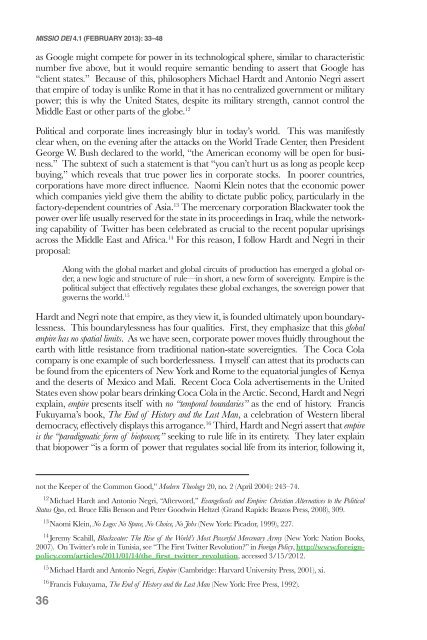VULNERABLE MISSION
VULNERABLE MISSION
VULNERABLE MISSION
You also want an ePaper? Increase the reach of your titles
YUMPU automatically turns print PDFs into web optimized ePapers that Google loves.
MISSIO DEI 4.1 (FEBRUARY 2013): 33–48<br />
as Google might compete for power in its technological sphere, similar to characteristic<br />
number five above, but it would require semantic bending to assert that Google has<br />
“client states.” Because of this, philosophers Michael Hardt and Antonio Negri assert<br />
that empire of today is unlike Rome in that it has no centralized government or military<br />
power; this is why the United States, despite its military strength, cannot control the<br />
Middle East or other parts of the globe. 12<br />
Political and corporate lines increasingly blur in today’s world. This was manifestly<br />
clear when, on the evening after the attacks on the World Trade Center, then President<br />
George W. Bush declared to the world, “the American economy will be open for business.”<br />
The subtext of such a statement is that “you can’t hurt us as long as people keep<br />
buying,” which reveals that true power lies in corporate stocks. In poorer countries,<br />
corporations have more direct influence. Naomi Klein notes that the economic power<br />
which companies yield give them the ability to dictate public policy, particularly in the<br />
factory-dependent countries of Asia. 13 The mercenary corporation Blackwater took the<br />
power over life usually reserved for the state in its proceedings in Iraq, while the networking<br />
capability of Twitter has been celebrated as crucial to the recent popular uprisings<br />
across the Middle East and Africa. 14 For this reason, I follow Hardt and Negri in their<br />
proposal:<br />
36<br />
Along with the global market and global circuits of production has emerged a global order,<br />
a new logic and structure of rule—in short, a new form of sovereignty. Empire is the<br />
political subject that effectively regulates these global exchanges, the sovereign power that<br />
governs the world. 15<br />
Hardt and Negri note that empire, as they view it, is founded ultimately upon boundarylessness.<br />
This boundarylessness has four qualities. First, they emphasize that this global<br />
empire has no spatial limits. As we have seen, corporate power moves fluidly throughout the<br />
earth with little resistance from traditional nation-state sovereignties. The Coca Cola<br />
company is one example of such borderlessness. I myself can attest that its products can<br />
be found from the epicenters of New York and Rome to the equatorial jungles of Kenya<br />
and the deserts of Mexico and Mali. Recent Coca Cola advertisements in the United<br />
States even show polar bears drinking Coca Cola in the Arctic. Second, Hardt and Negri<br />
explain, empire presents itself with no “temporal boundaries” as the end of history. Francis<br />
Fukuyama’s book, The End of History and the Last Man, a celebration of Western liberal<br />
democracy, effectively displays this arrogance. 16 Third, Hardt and Negri assert that empire<br />
is the “paradigmatic form of biopower,” seeking to rule life in its entirety. They later explain<br />
that biopower “is a form of power that regulates social life from its interior, following it,<br />
not the Keeper of the Common Good,” Modern Theology 20, no. 2 (April 2004): 243–74.<br />
12 Michael Hardt and Antonio Negri, “Afterword,” Evangelicals and Empire: Christian Alternatives to the Political<br />
Status Quo, ed. Bruce Ellis Benson and Peter Goodwin Heltzel (Grand Rapids: Brazos Press, 2008), 309.<br />
13 Naomi Klein, No Logo: No Space, No Choice, No Jobs (New York: Picador, 1999), 227.<br />
14 Jeremy Scahill, Blackwater: The Rise of the World’s Most Powerful Mercenary Army (New York: Nation Books,<br />
2007). On Twitter’s role in Tunisia, see “The First Twitter Revolution?” in Foreign Policy, http://www.foreignpolicy.com/articles/2011/01/14/the_first_twitter_revolution,<br />
accessed 3/15/2012.<br />
15 Michael Hardt and Antonio Negri, Empire (Cambridge: Harvard University Press, 2001), xi.<br />
16 Francis Fukuyama, The End of History and the Last Man (New York: Free Press, 1992).


